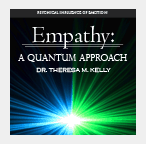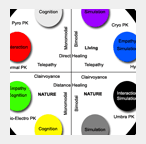Empathy
Parapsychology Articles, Papers and Books
Home > Articles > Psychical Phenomena > Extrasensory Perception > Empathy
![]()
|
| NEWSLETTERS |
| Get the best from QPsychics.com in your inbox! |
|
| PARAPSYCHOLOGY ORGANIZATIONS |
"With confidence in the importance of utilizing the investigative mode of the established sciences in order to inquire into the authenticity and to potentially explain the nature of psychical phenomena."  |
 |
 |
 |
 |
Empathic Interaction
Empathy is the psychical influence of emotion via experient influence over the emotional basis of consciousness and the mental and physiological processes associated with a wide variety of emotional experiences. Empathic interaction is the causal influence of one mind on another’s emotional state without the intervention of the five senses.” Per my own research, individuals who engage in empathic interaction (i.e. empathic impressionists) appear to do so in an authoritative manner as a command. These commands can be either suggestive, which is characteristic of a mild likelihood of influencing the emotions of subjects per the needs of the empathist, or compulsive, which is characteristic of a very strong likelihood of influencing the emotions of subjects per the needs of the empathist. The empathic impressionist does this as a means to instruct subjects to feel a particular way that is accommodating to the empathist. However, it appears that there may be an associated hypnotic element in regards to empathic interaction. Hypnogenic empathic interaction is a form of empathic interaction that is assumed involved in causing a mild hypnotic state in subjects, possibly involving impressed emotions related to relief, which results in the behaviors of relaxation or decompression, via an empathists command. This relaxed state allows for a more dominant approach by the empathist in influencing the emotions of others, and allows subjects to be more susceptible to impression. Unlike empathic simulation, this impressionistic process is void of the empathist having a similar emotional experience at the time of impression on subjects. In other words, the empathist is not simulating their own emotional experience onto subjects, rather the empathist is “generating” an emotional experience of their choosing in others that will be accommodating to the empathists needs/intentions. Hypnotic empathic interaction appears to be the strongest form of empathy and the most dangerous, raising an assortment of moral and ethical questions as to how such an ability should be utilized in practical applications. In regards to the emotional state of the empathist, in intentional empathic interaction, the empathist is typically in a relaxed state, while in regards to spontaneous empathic interaction, the empathist is typically in a stressed state.
(Adapted from the book “Empathy: A Quantum Approach - The Psychical Influence of Emotion” by Theresa M. Kelly, MsD.)
|
|||
Related Articles Suggested Reading |
|||

